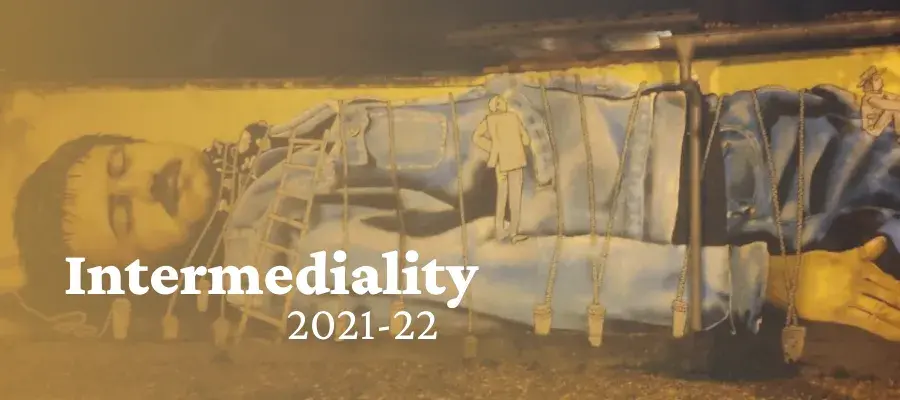In brief
Guest speaker - Pascale Aebischer
Title - The Haunted Stalls: Liveness and the Absent Audience in Pandemic Shakespeare
Theme - Digital Theatre
Series - Intermediality 2021-22
Abstract
by Pascale Aebischer
The Covid-19 pandemic has accelerated the trend towards digital dissemination of stage productions of Shakespeare and made-for-digital live productions which started to transform how audiences in much of the Western world accessed Shakespeare even before North American and European theatres went dark in March 2020.
One of the challenges posed by productions staged and broadcast during the pandemic was how to reimagine the role of the audience in relation to the performers when actors are performing to an empty auditorium and how to negotiate the relationship between what is present and what is absent, between the alive and the dead.
This seminar will focus on three productions staged during lockdown:
- Dimiter Gotscheff’s Hamletmaschine, performed by live actors alongside footage of the late Gotscheff for a performance broadcast from the Deutsches Theater Berlin in April 2020
- Johan Simons’ production of Hamlet at the Schauspielhaus Bochum recorded for the Berliner Festspiele Theatertreffen of May 2020
- Zoe Seaton’s Zoom production of Macbeth, performed live for the Belfast International Arts Festival in October 2020.
It will investigate how these productions activated the space of the empty auditorium in order to make present the absence of their audiences, turning the empty theatre into a metaphor for the precariousness of aliveness and of theatrical performance in the midst of an environment marked by absence, contagion and death.
About the speaker
Pascale Aebischer is Professor of Shakespeare and Early Modern Performance Studies.
She specialises in the history of the performance of early modern drama (including Shakespeare), with an emphasis on 1580s-1700 and 1980s-present. She has a particular interest in bodies and performance technologies (from candlelight through social media to ‘live’ theatre broadcast and digital performance).
These interests are reflected in her teaching, which focuses on early modern – Restoration theatrical cultures and performance practices, Shakespeare, and present-day performance on stages and screens.
From 2021 to 2023, Pascale Aebischer is leading the coordination of the AHRC’s Covid-19 research portfolio as Principal Investigator of The Pandemic and Beyond: the Arts and Humanities Contribution to Covid Research and Recovery.
About the Intermediality events
Led by Professor Marion Schmid and Dr Fabien Arribert-Narce, the research strand interrogates the theory and practice of ‘intermediality’, that is, the interrelationships between different art forms and their signification.
With a particular focus on events, several jointly organised with Meiji University in Tokyo, the strand brings together academics, research students and practitioners to foster exchange and initiate new collaborative projects.
The theme for this seminar is 'Digital Theatre', and the seminar is a part of the Intermediality Spring 2022 series of events.
This is an internal guest lecture, primarily aimed at Edinburgh-based colleagues and students. It will take place online on Zoom.
Are you interested in studying Intermediality?
As the first UNESCO World City of Literature, home of the Edinburgh International Festival and a major cultural hub, Edinburgh is the ideal place for the study of intermediality. Our one-year taught masters programme draws on world-class teaching and research expertise across media, from literature to film, music, painting, photography and visual culture more widely.
The programme will make you conversant with intermedial theory and equip you with the critical tools and historical background for understanding and analysing a wide range of intermedial phenomena across different periods and cultures. It can also be completed part-time over two years.


